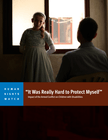(New York) – Benafsha Yaqoobi, an Afghan disability rights advocate, is the 2022 recipient of the Human Rights Watch Marca Bristo Fellowship for Courageous Leadership in Disability Rights, Human Rights Watch announced today.
Click to expand Image
Benafsha Yaqoobi, 2022 Marca Bristo Fellow
© 2022 Private
For years, Yaqoobi worked as an attorney defending the rights of women who faced violence. In 2008, she founded the Rahyab organization to provide education and rehabilitation for children with visual disabilities in Afghanistan and hosted a daily live TV show to raise awareness about disability rights. Yaqoobi later served as a commissioner at the Afghanistan Independent Human Rights Commission, where she was active in shaping labor rights and disability rights in the country. She co-drafted the commission’s proposed revisions to the 2013 Law on Rights and Privileges of Persons with Disabilities, as part of a revision process planned for 2022.
When the Taliban took control of the country in August 2021, she was forced to flee and was evacuated to the United Kingdom.
“Benafsha experienced firsthand what it’s like for a blind person to urgently flee and seek refuge with little to no assistance,” said Shantha Rau Barriga, disability rights director at Human Rights Watch.” She continues to advocate for Afghans with disabilities to no longer be an afterthought in humanitarian response. And despite Taliban rule, she has not given up on her fight for the right of Afghan girls with disabilities to go to school.”
Human Rights Watch began collaborating with Yaqoobi earlier in 2022, during the United Nations review of Afghanistan’s obligations under the UN disability rights treaty. Yaqoobi was also a valuable resource for partners involved in humanitarian support for people with disabilities following this year’s devastating earthquake in eastern Afghanistan.
Now in exile, Yaqoobi continues to advocate for the rights of people with disabilities in Afghanistan, who she fears face even greater discrimination after the Taliban’s return. The political situation has exacerbated pre-existing stigma and inaccessibility in the country, which has one of the world’s largest populations per capita of people with disabilities, in part due to its decades of conflict. Because of her work, the BBC included her in its list of 100 inspiring and influential women in the world for 2021.
“I want to use this fellowship as a way to advocate for people with disabilities all over the world, especially those who are living through conflicts and feel invisible,” Yaqoobi said. “I am grateful to Human Rights Watch for choosing me for this prestigious honor and will work very hard to make sure people with disabilities, in particular girls with disabilities, are seen and heard.”
Yaqoobi was selected from a competitive pool of candidates nominated by Human Rights Watch staff for their disability rights work. As part of her fellowship, Yaqoobi will receive training in research, advocacy, communications, and fundraising from Human Rights Watch colleagues during 2023. The fellowship will provide opportunities for Yaqoobi to strengthen her networks with other organizations and advocates, particularly those working on risk reduction in disasters for people with disabilities and inclusive education in conflict zones.
Human Rights Watch established the fellowship to honor the disability rights icon Marca Bristo, founder of Access Living and inaugural chair of the Human Rights Watch disability rights advisory committee. Bristo was a key advocate for the adoption of the 1990 Americans with Disabilities Act and helped shape Human Rights Watch’s disability rights strategy. She encouraged Human Rights Watch to actively involve people with disabilities in its work and to invest in the development of emerging disability rights activists.
Previous Marca Bristo fellows, Hauwa Ojeifo and Bryan Russell, have continued to promote disability rights with added skills to do their work effectively. Ojeifo, a mental health activist from Nigeria, delivered an opening statement at the 14th United Nations Conference of State Parties (COSP) to the Convention on the Rights of Persons with Disabilities. Russell, a young man with intellectual disability who ran for Congressional office in Peru, traveled to Mexico to support a group of advocates with intellectual disabilities who were demanding inclusion in politics.
Daisy Feidt, executive vice president of Access Living, said: “Over the years, this fellowship has supported rising leaders in the disability rights movement. I am certain that Mrs. Yaqoobi will use this opportunity to strengthen her already impressive work on inclusive education and inclusive humanitarian response. Marca would be proud.”




